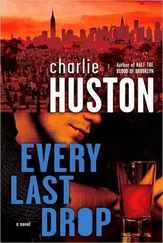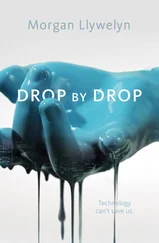To Pamela's mind, the inside of the general store was a perfect example of order in chaos. She'd always believed in the kind of probity that comes of sparseness and the ascetic lifestyle, and she'd kept her Anchorage apartment free of the clutter and kitsch that dominated her friends' places-the soapstone and walrus tusk carvings, the polished caribou racks, taxidermy displays and native scenes in birchbark frames, not to mention the stereos and Crock-Pots and closets full of shoes, handbags, cableknit sweaters and beaded mukluks. Things oppressed her. Man-made things, trinkets and gizmos and the newest and the latest, all the incalculable piles of junk every good red-blooded American needed to survive. She wasn't buying into it, and she never had. What she admired was the kind of self-sufficiency of the early prospectors who thought nothing of going out for a month at a time with little more than a gun, a length of fishing line, a sack of rice, six ounces of salt and some loose tea in a tin. Strip it down to the basics. Live off what the land gives you.
Still, she had to admire what Wetzel Setzler had done with the two low-slung rooms of the big blackened overblown log structure that dominated the main street-the only street, really-of Boynton. Sess had told her the place was a remnant from the time at the turn of the century when Boynton boasted twelve hundred people, an opera house and twenty-eight saloons and the sourdoughs' pans were still showing color along the Kandik and the Charley, a time when the Northern Navigation Company ran thirty-two stern-wheel steamboats up and down the river to accommodate the traffic, and that made her wonder all the more what these hordes of people were thinking when they came swarming into a territory they didn't know the first thing about. But then she already knew the answer: rape and plunder, that was what they were thinking, and nothing beyond. Take the gold out of the country, take the meat, take the furs, and then fold up your tents and vanish to Cleveland, to Sacramento, to Montpelier and Miami Beach.
Wetzel Setzler probably had three thousand items on display, from spark plugs, cartridges, fishing lures, beaver traps and crescent wrenches to maraschino cherries, insulated socks, overalls, canned wax beans, hard liquor and sixteen different varieties of candy and gum, and every one of them in its separate bin and clearly marked with a price in hand-printed block letters so uniform they might have been stamped on by the manufacturer. There was a stove in the middle of the place with a couple of chairs set round it, a dangle of things trailing from hooks nailed into the overhead beams and a glass-front cooler with soft drinks, canned beer and even milk, butter and whipping cream brought in once a week from a supermarket in Fairbanks and sold at three times the price. If it weren't for the cooler the place could have jumped right out of the pages of a book of old-time photos or maybe even daguerreotypes, the kind of thing her mother always had out on the coffee table for guests to thumb through, _How Our Forefathers Lived__ or _Country Stores of the Old West.__
When Pamela stepped in the door, there was nobody in the place, though it was ten o'clock in the morning and people were moving up and down the street outside like bloodclots working their slow way through the veins of the town. A bell over the door announced her presence, but no one-not Wetzel Setzler or a shopboy, if the breed existed this far out-appeared from the back room to acknowledge her. It was preternaturally still, as if the place existed outside of time; the only light was what spilled in through the windows. The thought came into her head that she could rob them blind, take anything she wanted, take all she could carry and set up a rival store across the street, and they wouldn't be any the wiser. “Hello?” she called. “Anybody here?”
She found herself staring into the jaws of what must have been a bear trap dangling from a chain overhead, a huge dark wedge of blue-black steel, faintly glistening in the morning light. Here was a trap that meant business, lethal and unyielding, and she imagined it artfully buried next to a carcass or along a game trail like the discharge of a bad dream, and for just a moment, looking into its teeth, she felt the cruelty of it, and was this what Sess had been trying to tell her the night they'd got drunk? It was a trap. A necessary accoutrement to the wild life. You trapped things and then you killed them, skinned them and fed them to the dogs, and the money from the skins bought you sugar, coffee, cartridges, more traps. That was what she was buying into, and it was a matter of choice, of her own pleasure and inclination, as much as it was about survival-all those little lives would feed her own, as if she were some god on high demanding sacrifice.
Next to the trap, nailed to the swell of the shellacked beam as if to make light of the whole business, was an old-fashioned bicycle horn with its tarnished brass tube and black rubber bulb. Before she could think, she was reaching up to squeeze the bulb and a low flatulent wheeze of a sound announced her presence. “Hello?” she called again.
No response.
But maybe they weren't open yet, maybe that was it. Maybe they were all so trusting they just left their doors unlocked up and down the street and people could come and go as they pleased, pick out what they wanted and pay on the honor system. There was a door at the rear of the place marked OFFICE in the same meticulous block letters that set out the prices on the bins, and she went to it and tried the handle. She rapped formally with the knuckles of her left hand even as she pushed the door open and found herself on the threshold of a windowless den with a desk, a filing cabinet and cardboard boxes of liquor stacked floor to ceiling against the walls. There was a smell of burnt wax or lantern oil, something chemical, at any rate, mingled with the scents of Pine-Sol and the mold it was meant to defeat.
As she leaned into the doorway, the floorboards groaned beneath her feet and she stopped where she was, embarrassed suddenly. She had no business in the lair of a man she barely knew, his socks and yellowed T-shirt laid over the back of the chair to dry as if he'd done his washing one piece at a time, his tooth-worried pipes laid out in a row atop the filing cabinet beside a framed photo of his younger self and a woman twice his size in a print dress, both of them glaring into the sun as if they'd just emerged from a cave. There was a pair of boots in the corner, pipe cleaners in a jar, a dismantled fishing reel laid out on a piece of newspaper. She saw the radio then, right there on the desk with a set of headphones and a mike attached to it, and that impressed her in the way of the bear trap-this was a different world out here, a different life, and it was going to take some getting used to. Of course it was. And her mother could wait, she decided, thinking it would be cheaper to call from a real phone in Fairbanks, anyway-_if__ they could dig up Richard Schrader, and _if__ his truck was available-and she backed out of the office and eased the door shut behind her.
She called out once more-“Hello? Is anybody here?”-and then she drifted down the aisles, lost amidst the galvanized buckets and Blazo cans, the deck screws, pickaxes, fishing lures and cellophane-wrapped loaves of six-day-old bread. Just for an instant, she felt a pang. She did want to talk to her mother-it was vital-and not so much to reassure her as to let her know that she could succeed where her mother had failed, that she knew what she was doing and it was all turning out right, better than right. She was happy. Ecstatic. And her mother ought to know that.
Her mother had seemed to approve of Sess in a general way, but she'd been leery from the start about the whole idea of living in the bush. “I had enough of that when your father was prospecting all those summers when you were little,” she said, and it was like a litany, like a catechism Pamela could have repeated word for word. “Oh, it might have been a lark for you two girls, but for me it was just another cross to bear, trying to cook for four over an open fire, staying up half the night swatting mosquitoes and wondering if he was ever going to come back, if he'd broken a leg or been attacked by a bear or drowned fording a creek, and that was the worst of it, to think of him floating out there like some waterlogged piece of yesterday's meat, food for the ravens, for the ants-”
Читать дальше












